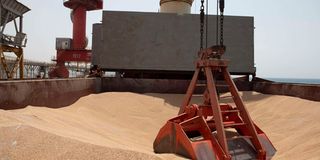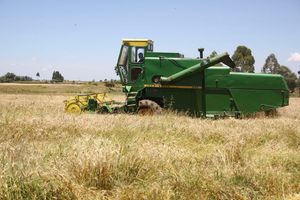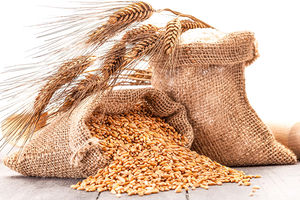
Loaders carry sacks of wheat from Narok County after drying in the sun in Barnabas, Nakuru County, 19 February 2025.
Local wheat growers have been hung out to dry after the government allowed millers, who are behind most well-known flour brands, to spend at least Sh124.5 billion to import over 3.2 million tonnes of the grain, despite farmers having a good harvest.
Following the greenlight given to the millers to import wheat, local farmers may be forced to sell their grain at a loss to avoid losing their entire harvest.
The wheat farmers have held several protests to voice their discontent. The have persistently complained that they are being undercut by millers who are flooding the market with cheap imports.
A group of 35 millers is behind the importation of wheat. Some tycoons have been in the sector for decades, while other dealers have joined the business to diversify their wealth portfolios.
The controversy has now found its way to the floor of the Senate, which is investigating why the firms were allowed to import 35.572 million bags of wheat.
Last month, the Cereal Millers Association said that a 90kg bag of wheat shipped in from other countries costs between Sh3,500 and Sh3,700. On the other hand, a 90kg produced by local farmers is Sh5,300.
This means, that going by the lower price of Sh3,500 per 90kg bag, the total amount involved is over Sh124.5 billion.
Raising the alarm, Narok Senator Ledama Olekina named at least 12 millers who have been granted a blank cheque to import wheat for a year despite farmers being stuck with thousands of unsold bags of wheat.
The senator said the millers have been granted permission to import varying quantities of wheat without the country ascertaining if there is a deficit or not.
The firms include Capwell Industries (65,000 metric tonnes), Lukenya Flour Mills Limited (33,000 metric tonnes (MT)), Karibu Flour Mills (60,000MT), Malindi Flour Millers Limited (27,500MT), Bakex Millers Limited (50,000MT) and Weetabix East African Limited (5,000MT).
Others are Eldoret Grains Limited (5,000 metric tonnes), Joy Millers Limited (200,000MT), Kitui Flour Mills (324,000MT), Rafiki Millers Limited (40,000MT), Jamii Milling Limited (24,000MT), and Alpha Grain Millers Limited (45,000MT).
The lawmaker questioned the rationale used by Agriculture Cabinet Secretary Mutahi Kagwe and his Treasury counterpart, John Mbadi, to allow such a huge quantity of wheat to be imported at a time when Kenyan farmers have not sold their produce from last year.
“We need to know whether the two ministers are working together to determine what would be the shortage of wheat after sweeping all locally available wheat,” said Senator Olekina.
“They ought to do so before agreeing to the quota allocated by the Council of East African Ministers, which is a total of 3,096,500 metric tonnes of wheat grains, which has caused tremendous suffering of local farmers whose produce for 2024 is still in their stores,” he added.
The senator wondered why millers opted to import cheap grains rather than buy the produce from local farmers. He said Mr Kagwe must tell Kenyans if there is a wheat deficit, and if so, to what scale.
Wheat is Kenya’s second largest grown cereal after maize. It is mainly grown in five counties; Narok, Uasin Gishu, Nakuru, Laikipia, and Meru.
According to a legal notice by the East African Community (EAC) dated July 27, 2024, some 35 millers have been approved to import more than 3.2 million metric tonnes of wheat grains as part of Kenya’s quota for a year up to June 30, 2025.
The firms have also been granted a 10 per cent duty remission on specified quantities of wheat grain pursuant to Section 140 of the EAC Customs Management Act 2004 and Regulations 3 and 6 of the AAC Customs Management (Duty Remission) Regulations, 2008.
The legal notice is signed by South Sudan Treasury minister Deng Alor Kuol who is the chairperson of the Council of Ministers for the East African Community (EAC).
The Council is composed of ministers from across the EAC in charge of the Treasury, who agree on what will be zero-rated to allow millers to import. Kenya is a signatory to the Council.
Apart from the 12 millers mentioned by Senator Olekina, the notice lists Rashid Industries Limited (10,000MT), United Millers Limited (105,000MT), Grainden Miller Limited (28,000MT), Kabansora Millers Limited (90,000MT), Alicia Bakers and Confectioners Limited (15,000MT), Shalem Investment Limited (5,000MT), Mombasa Maize Millers (NRB) Limited (110,000MT), Mombasa Maize Millers (KSM) Limited (230,000MT), Mombasa Maize Millers Limited (240,000MT) and Mombasa Maize Millers (NKR) Limited (80,000MT).
Others are Mama Millers Limited (6,000MT), Unga Limited (108,000MT), Pembe Flour Mills Limited (220,000MT), Grain Industries Limited (470,000MT), Atta (Kenya) Limited (85,000MT), Kenblest Processors Limited (87,000MT), Spice World Limited (2,000MT) and Baraka Kenya Limited (22,000MT).

A farmer uses a combine harvester to harvest wheat at a farm in Uasin Gishu County.
The list is concluded by Uzuri Foods Limited (205,000MT), Uplands Crops Limited (40,000MT), Maisha Flour Mills Limited (17,000MT), Ustawi Grain Millers Limited (90,000MT) and Spenza Limited (50,000).
Farmers' protests

Angry wheat farmers hold a demonstration in Narok town on February 24, 2025.
Wheat farmers across the country have been protesting over the lack of market for their crop, saying that since they started their harvest in August last year, they have not succeeded in selling their wheat.
Members of the Cereal Growers Association (CGA) accused millers of prioritising cheaper imported wheat over locally produced grain, despite a government-backed programme designed to support local farmers.
The programme is aimed at reducing overreliance on imported wheat and has been frustrated by millers who have failed to buy local wheat at agreed prices.
Under the programme, millers are allowed to import wheat at a lower duty rate of 10 per cent instead of the 35 per cent stipulated in the EAC Common External Tariff. This tax break saves approximately Sh20 billion annually.
However, in return, millers are required to mop up locally produced wheat based on the minimum price set through consultations between the CGA and the government.
For the 2024/2025 season, the agreed minimum price for locally produced wheat is Sh5,300 per 90kg bag for Grade 1 wheat and Sh5,200 for Grade 2.
Wheat traded in Kenya is classified into three categories; Grade 1, 2, and 3 based on the bushels, which is the weight of crop yield per acre at harvest.
Farmers, however, said millers are ignoring these prices and instead offering as little as Sh3,800 per bag, an amount lower than the cost of production which they said stands at Sh5,000 per 90kg bag.
The farmers vowed to continue with their protest until CS Kagwe stops the importation of wheat, which they say is distorting the market.
CS Kagwe responds

Agriculture Cabinet Secretary Mutahi Kagwe.
In a statement on Monday, CS Kagwe said he has resolved the wheat crisis where farmers were stranded with 321,000 bags of wheat after harvest. He said he has directed all farmers and aggregators to deliver their stock to NCPB from Tuesday.
The CS also announced that NCPB's payments to farmers will take place within 30 days after delivery to warehouses across the country.
According to a memorandum of understanding to be signed today between the NCPB and millers, payments will be done within 14 to 21 days.
Speaking in a meeting with NCPB managing director Samuel Karogo, AFA director-general Bruno Linyiru, Cereals Millers Association led by its chief executive officer Paloma Fernandez and CGA led by its CEO Anthony Kioko, the CS hinted at reducing importation of wheat by ensuring local farmers produce from the current eight percent to above 40 percent demanded by Millers.
Wheat products are some of the most consumed food commodities in Kenya with an average of about 18 million bags per year.
Nairobi Senator Edwin Sifuna said he is surprised Kenya would subscribe to such a legal notice when local wheat farmers have their produce rotting in their stores.
“As sugarcane farmers, we have complained for a very long time… as long as you allow wanton importation of sugar, you are hurting the local farmers in the sugarcane growing areas,” said Mr Sifuna.
“That is the same situation now with wheat. I am quite surprised that Kenya would subscribe to such a situation, where we have farmers whose crop is literally rotting in their stores and yet we have allowed importation of wheat to this extent. This is unacceptable,” he added.
The ODM secretary-general said ministers, Mr Kagwe and Mr Mbadi, should to be summoned before the Senate’s Agriculture Committee to shed more light on the matter.
“We must give priority to our own people to help them get out of the economic mess. We cannot have our own farmers’ produce rotting, yet we are allowing importation of the same commodity that we have in plenty,” he said.
Kirinyaga Senator James Murango said the problem is not limited to wheat alone but to other crops like maize. He said that Kenya has been turned into a dumping ground for cheap imports at the expense of farmers.
“When will our laws take care of our farmers? Some countries have turned our country into their market with their cheap produce because they are benefiting from subsidies. We have turned into a dumping ground for anything cheap,” said Mr Murango.
Nandi Senator Samson Cherargei said the Kenya National Trading Corporation and Agriculture and Food Authority (AFA) must be called out and the gazette notice de-gazetted by the Treasury.
“Who authorised the importation of sugar, rice and maize, yet we are in the harvesting season? This gazette notice must be de-gazetted by the Ministry of the National Treasury and Economic Planning. We expect Hon. Mbadi to do better by revoking most of those gazette notices,” said Senator Cherargei.
Kilifi Senator Stewart Madzayo said the government should make sure local wheat farmers are able to sell their produce outside the country instead of flooding the local market with imports.

A ship loaded with 23,000 tonnes of wheat.
He said that of the affected farmers is Bomet Senator Hilary Sigei who told him he had a bumper harvest but he has nowhere to take his harvest. He said he might be forced to give the wheat out for free or let it rot in the store.
“This is a disgrace and a slap in the face of our farmers. Most of these farmers are now stuck with their produce not knowing where to sell them. There is no need to import wheat as this will only lead to losses for our farmers,” said the Senate minority leader.
Wheat production in the country decreased by 16.1 percent from 368,700 tonnes in 2022 to 309,500 tonnes in 2023 as farmers opted to cultivate maize farming, according to the Economic Survey 2024.
On the other hand, the quantity of imported wheat rose by 21.5 percent to 2.03 million tonnes in 2023.










